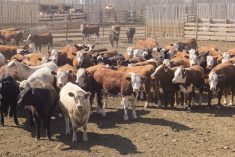Talks aimed at easing or lifting trade barriers for southbound Canadian livestock were more productive Thursday in Mexico City than earlier this week in Washington, according to Canada’s Agriculture Minister Gerry Ritz.
Both nations are currently up against the United States on Washington’s planned changes to its mandatory country-of-origin labelling (COOL) law — and if Canada has to resort to retaliatory tariffs, Ritz now warns they may affect other products apart from northbound U.S. beef and pork.
Ritz completed trade talks with Mexican officials Thursday, including that country’s secretary of economy, Ildefonso Guajardo, and secretary of agriculture Enrique Martinez y Martinez.
Read Also

U.S. livestock: Feeder cattle hit contract highs on tight supply
Chicago | Reuters – All Chicago Mercantile Exchange feeder cattle futures and most live cattle futures hit contract highs on…
The officials discussed strategies to respond to COOL and regaining market access for Canadian cattle in Mexico.
Currently Mexico doesn’t allow imports of Canadian cattle that are over 30 months old (OTM). Mexican officials say it’s a health issue for consumers.
“They’ve been hiding behind that old saw for a while now,” said Ritz during a conference call with reporters.
But Ritz said talks around the 30-month issue were productive.
“When it comes to the (OTM rule), the optimist in me says, ‘Yes, the time and place is right for movement on that issue.’ Hopefully within the coming weeks we’ll see something.”
Talks earlier this week with U.S. Department of Agriculture Secretary Tom Vilsack on COOL were less productive, he said.
“I did not get a warm fuzzy feeling on movement forward,” Ritz said of his talks with Vilsack about COOL.
“They are stuck in a situation that they have made for themselves. At the end of the day, we’re certainly here to help them pass that political hurdle, and if it takes retaliatory actions to make that happen, so be it.
“We would prefer to see this resolved by the May 23 deadline as opposed to dragging on back and forth through the (World Trade Organization) process, which could take upwards of a year and a half to two years.”
Earlier this week Ritz said annual trade retaliation against the U.S. over COOL could add up to $1 billion. Today he said he saw retaliatory measures going beyond U.S. beef and pork.
“It’s hard to put retaliatory measures on your allies in this situation, and the American industry is very much on side with us, as I said. They’re facing as much or more hurt at the end of the day,” said Ritz.
“How they adjust”
The U.S. introduced mandatory COOL for meat in 2009. Both Canada and Mexico successfully challenged COOL at the World Trade Organization’s Dispute Settlement Body in 2011 — a decision upheld last year by the WTO’s Appellate Body.
However, the U.S. government last month responded by proposing a different set of COOL rules requiring even more specific labels for meat and other affected products.
“We had very productive talks with the Mexicans on the way forward should the COOL resolution not be changed before May 23 and in a way that we feel addresses the WTO mandate. Mexico is very much on our side with that,” Ritz said Thursday.
The comment period for USDA’s proposed changes to COOL expired Thursday, Ritz noted.
“I know Canada has put forward their problems with the proposed rule, as has Mexico. And we’ll have to wait and see how they adjust to that comment that they’ve received.”
Canada and Mexico are members of NAFTA and the Trans-Pacific Partnership, which focuses on market access in Asia. Both countries are major trading partners as well. Total agriculture and food trade between the two countries topped $3 billion in 2012.
“As trade partners, we need to work together to ensure trade is contributing to the productivity and competitiveness of the sector for the benefit of all producers. The flow of cross-border trade is essential to economic growth,” said Ritz.
— Lisa Guenther is a field editor for Grainews at Livelong, Sask. Follow her @LtoG on Twitter.
















